
The 2023-2024 Humanities Dialogue
SOVEREIGNTIES
A year-long conversation that mobilizes humanities research to question, understand, and reimagine sovereignties—bodily, artistic, intellectual, geopolitical—and their global histories, contemporary challenges, and possible futures
Bodies • States and Non-States • Nations • Biopolitics • Belonging • Entanglement • Erasure • Disenchantment • Data • Lands • Libraries • Citizens • Propaganda • Censorship • Food • Repatriation
This Dialogue series seeks to examine Sovereignties in many dimensions. Restrictions on bodily autonomy—from borders to identity to reproductive rights—are pressing in familiar and unfamiliar ways. Collectives and individuals are practicing sovereignty beyond state formations—in gardens, on floating cities, in activist solidarities—even while confronting the consequences of pollution that seeps into bodies and foods. The Kaplan Humanities Institute Sovereignties Dialogue will contend with these contradictions, the histories that re-emerge in the present, and the forms of belonging forged against, within, and beyond the state.
Each year, the goal of the Dialogue is to build a multi-layered conversation showcasing ways that different humanities- and art-related approaches shape the debate around a timely subject. The Sovereignties Dialogue included talks with scholars, public intellectuals, artists, and activists from a variety of disciplines, geographic areas of focus, and historical periods via:
- Quarterly keynotes – three large-scale keynotes
- Co-sponsored events – with Northwestern departments and programs
- Course enhancement grants – for enriching courses related to the theme
KEYNOTES
spring 2024 keynote
Dialogue on Food Sovereignties
Thurs., May 9, 2024
12:00 - 1:30 pm
Scott Hall - Guild Lounge (601 University Place)
Lunch will be served.

Raj Patel is Research Professor at the Lyndon B. Johnson School of Public Affairs, University of Texas, Austin, and member of the International Panel of Experts on Sustainable Food Systems.
Monica White is Distinguished Chair of Integrated Environmental Studies and Associate Professor of Environmental Justice at the University of Wisconsin-Madison, and past president of the Board of Directors for the Detroit Black Community Food Security Network.
Moderator: Amanda Logan (Associate Professor, Department of Anthropology)
In today's world, access to food is profoundly unequal. The food sovereignty movement demands that food should be a right of all people, regardless of race, politics, or class. In this conversation, two leading food sovereignty scholars, Raj Patel and Monica White, discuss the structural changes and community-based strategies that can make our food system more equitable. The discussion will be moderated by Northwestern's Amanda Logan, an archaeologist of food security.
winter 2024 Keynote
Bodies, Biopolitics, & Belonging
Wed., February 7, 2024
5:00 - 6:30 pm
Harris Hall #108 (reception to follow)

Jennifer L. Morgan (New York University, Social and Cultural Analysis and History)
Michelle Murphy (University of Toronto, History + Women and Gender Studies Institute)
Moderator: Katie Watson (Associate Professor of Medical Education, Medical Social Sciences [Determinants of Health], and Obstetrics and Gynecology, Feinberg School of Medicine)
This conversation will engage the long historical scope and global geographic scale of threats to bodily safety and reproductive justice, with an eye as well to the forms of resistance and belonging forged nonetheless.
Fall 2023 Keynote
Sovereignty Struggles Through and Beyond the State
Tues., October 17, 2023
3:30 - 5:00 pm (followed by a reception)
Norris University Center - Louis Room (North)

Yarimar Bonilla, political anthropologist (Professor in American Studies, Effron Center for the Study of America at Princeton University)
Adrian De Leon, writer and public historian (Assistant Professor of U.S. History, New York University).
Moderator: katrina quisumbing king (Assistant Professor of Sociology and Kaplan Institute Fellow)
In conversation with moderator katrina quisumbing king, Yarimar Bonilla and Adrian De Leon will reflect on how humanistic and creative approaches shed important light on the tremendous political battles for sovereignty today. Bringing their own creative and scholarly work on US empire to bear on this question, Bonilla and De Leon will discuss how histories re-emerge in the present and shape the ways states try to control people’s movements and territory as well as how individuals and collectives create their own resistant sovereignties.
Yarimar Bonilla is a professor at the Effron Center for the Study of America at Princeton University and a contributing writer for the New York Times. Both an accomplished scholar and a prominent public intellectual, Dr. Bonilla teaches and writes broadly on questions of race, citizenship, empire, and the entanglements of postcolonial sovereignty. She is the author and editor of several books, including Non-Sovereign Futures: French Caribbean Politics in the Wake of Disenchantment, Aftershocks of Disaster: Puerto Rico Before and After the Storm, and Trouillot Remixed: The Michel Rolph Trouillot Reader.
Adrian De Leon is the author of barangay: an offshore poem (Buckrider Books, 2021) and Bundok: A Hinterland History of Filipino America (University of North Carolina Press, Dec. 2023). His current book project, Balikbayan: The Invention of the Filipino Homeland, is under contract with the University of Washington Press. He is the 2023-2024 Jack and Nancy Farley Distinguished Visiting Scholar in History at Simon Fraser University, and an incoming Assistant Professor of U.S. History at New York University.
Co-sponsored SOVEREIGNTIES events
spring 2024
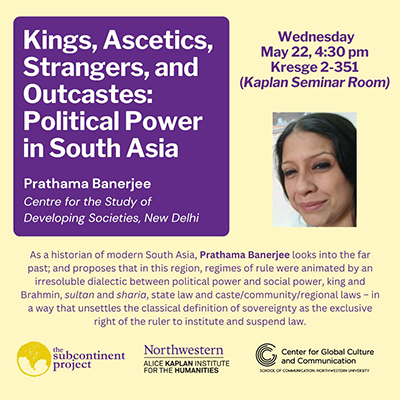 Kings, Ascetics, Strangers, and Outcastes: Political Power in South Asia
Kings, Ascetics, Strangers, and Outcastes: Political Power in South Asia
Prathama Banerjee (Centre for the Study of Developing Societies, New Delhi)
Wed., May 22, 2024
4:30 pm
Kresge #2351 (Kaplan Institute seminar room)
Presented by the Subcontinent Project and the Center for Global Culture and Communication with co-sponsorship from Kaplan Humanities Institute.
As a historian of modern south Asia, Prathama Banerjee looks into the far past, and proposes that in this region, regimes of rule were animated by an irresoluble dialectic between political power and social power, king and Brahmin, sultan and sharia, state law and caste/community/regional laws—in a way that unsettles the classical definition of sovereignty as the exclusive right of the ruler to institute and suspend law. To understand political power in south Asia, therefore, we must attend to the social constitution as much as to the state.
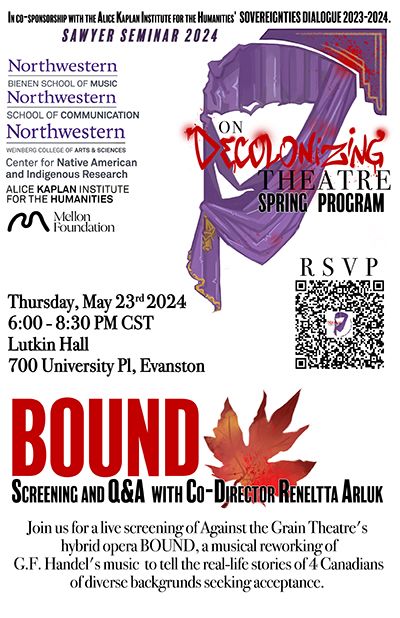 BOUND—Screening and Q&A
BOUND—Screening and Q&A
Thurs., May 23, 2024
6:00 - 8:30 pm
Lutkin Hall (700 University Place, Evanston)
Presented by On Decolonizing Theatre (co-sponsored by the School of Communication, Bienen School of Music, and Weinberg College of Arts and Sciences) with co-sponsorship from Kaplan Humanities Institute.
Screening of the hybrid opera BOUND followed by a Q&A with its director Reneltta Arluk (Inuvialuit, Cree, Dene), founder of Akpik Theatre (the only professional Indigenous theatre company in the Northwest Territories), former Director of Indigenous Arts at the Banff Centre for Arts and Creativity, and the first Indigenous woman to direct at the Stratford Festival.
BOUND entails four testimonies—from a worker in the oil industry who struggled with issues related to her gender identity, a Ugandan immigrant to Canada who faced barriers from racism, a doctor who did her residency amidst Flint MI’s water crisis, and a native of Dubai who strove unsuccessfully to utilize her expertise in her new country—interwoven with a score inspired by Handel and sung by Miriam Khalil (soprano), Andrew Haji (tenor), Justin Welsh (baritone), and trans woman Breanna Sinclairé (lyric soprano). This is a singular opportunity to meet with such a distinguished artist and to engage with a work that foregrounds perspectives vital to the concerns of immigrants, trans people, political refugees, and others buffeted by alienation, adaptation, and transformation. Click here for more info on BOUND.
On Decolonizing Theatre, funded by a Mellon Foundation Sawyer Seminar, features a series of events and curricular offerings during the 2023-2024 academic year on the theme of how performers and theater directors have been grappling with issues relating to colonialism, imperialism, racism, patriarchy, and misogyny in theatrical works from the late 17th through the early 19th century, including plays, operas, and ballets.
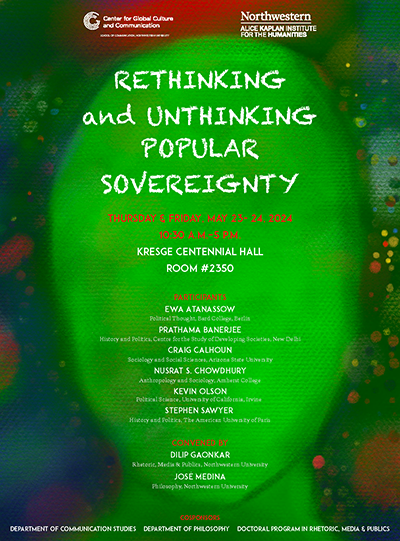 Rethinking and Unthinking Popular Sovereignty
Rethinking and Unthinking Popular Sovereignty
Thurs./Fri., May 23-24, 2024
10:30 am - 5:00pm
Kresge #2351 (Kaplan Institute seminar room)
Presented by the Center for Global Culture and Communication, Department of Communication Studies, Department of Philosophy, and Doctoral Program in Rhetoric, Media, and Publics with co-sponsorship from Kaplan Humanities Institute.
This conference will explore the contested history and ideology of democracy from the perspective of the doctrine of popular sovereignty—the proposition that people are the ultimate source of political authority and legitimacy in any polity. How and when and in what legible form did the doctrine of popular sovereignty originate and emerge? How did it evolve and become fully embedded in the democratic project? How is this doctrine, especially its two rhetorically powerful formulations— “we, the people” and “in the name of people”—invoked and deployed by two competing versions of the democratic project, the liberal and the populist? How does this doctrine function, both conceptually and rhetorically, in the perennial struggle between two opposing and problematic tendencies within the democratic project, namely, the cosmopolitan/liberal inclusionary tendency and the nationalist/populist exclusionary tendency?
Lunch and light refreshments will be served on both days.
Convened by Dilip Gaonkar (Rhetoric, Media, and Publics) and José Medina (Philosophy).
Participants:
- Ewa Atanassow (Political Thought, Bard College, Berlin)
- Prathama Banerjee (History and Political Thought, Centre for the Study of Developing Societies, CSDS, New Delhi, India)
- Craig Calhoun (Sociology and Social Science, Arizona State University)
- Nusrat S. Chowdhury (Anthropology and Sociology, Amherst College)
- Kevin Olson (Political Science University of California Irvine)
- Stephen Sawyer (History and Politics, American University of Paris)
Full schedule here:
Past Co-Sponsored Events
spring 2024
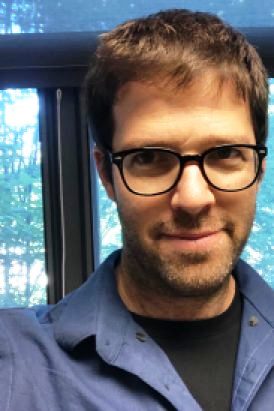 Rethinking Centralization: Petitioning and Sovereignty in the Spanish Monarchy, 1480-1500
Rethinking Centralization: Petitioning and Sovereignty in the Spanish Monarchy, 1480-1500
Yanay Israeli, University of Michigan
Wed., April 10, 2024
4:00 - 5:30 pm
Harris Hall #108
Presented by the Department of Spanish and Portuguese, with co-sponsorship from Kaplan Humanities Institute.
At the end of the fifteenth century, the Catholic Kings Fernando and Isabel formed a new state and reformed the previous legal and political institutions of their kingdoms, Aragon and Castile. Yet sovereignty, as Yanay Israeli shows in his ground-breaking work, was a process in which ordinary women and men from different echelons of Spanish society played a crucial role, disseminating a discourse of royal sovereignty that asserted the judicial supremacy of the monarchs and portrayed them as just and capable rulers. In this talk, Israeli will demonstrate how sovereignty is the outcome of bottom-up processes of litigation, and specifically petitioning which intensified communications between the Crown and non-elites. While the petitioners—Christians, Muslims and Jews—sought empowerment and support for their own social or judicial causes, their participation in this legal process offered new legitimacy to a growing Spanish royal power. Thus, petitioners were not only the recipients of the monarch’s benevolent power but also important advocates of royal sovereignty in their localities. Based on his archival work and the reconstruction of the fifteenth-century petition and response process through thousands of petitions, Israeli explains how sovereignty was practiced on the ground and how it was negotiated. By following “Justice letters” that were issued by the Crown, or the “afterlife” of these petitions, we learn how Spaniards embraced, challenged, delayed, disobeyed, and sometimes even attacked royal messengers and decrees, thus insisting on taking an active part in shaping royal justice at every stage of the process. Israeli gives special attention to their social response as well as to the physical aspects of sovereignty-making, from the paper on which justice letters were written to the long distances Spanish subjects crossed, over mountains and rivers, to be heard by the court.
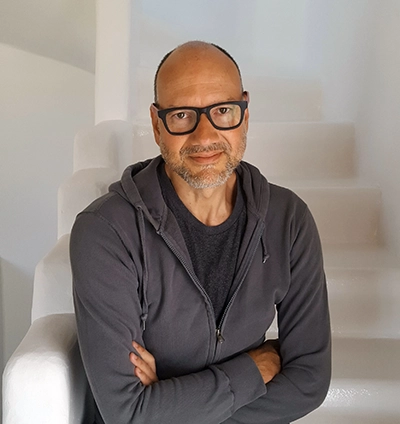 Comparative Politics Workshop with Stathis N. Kalyvas (University of Oxford)
Comparative Politics Workshop with Stathis N. Kalyvas (University of Oxford)
Fri., April 12, 2024
12:15 - 1:45 pm
Scott Hall, Room 212 (601 University Place)
Zoom also available. Click HERE to register.
Presented by the Comparative Politics Workshop of the Department of Political Science, with co-sponsorship from Kaplan Humanities Institute.
Stathis N. Kalyvas is Gladstone Professor of Government and fellow of All Souls College at Oxford. Until 2018 he was Arnold Wolfers Professor of Political Science at Yale University, where he founded and directed the Program on Order, Conflict, and Violence and co-directed the Hellenic Studies Program. In 2019 he founded and directs the T. E. Lawrence Program on Conflict and Violence at All Souls College. Kalyvas obtained his BA from the University of Athens (1986) and his M.A. and Ph.D. from the University of Chicago (1993), all in political science. He taught at Ohio State University (1993-94), New York University (1994-2000), the University of Chicago (2000-03), Yale University (2003-2017) before joining Oxford in 2018. He has held visiting professorships and fellowships at Sciences Po-Paris, Oxford, the University of São Paulo, Lingnan University of Hong Kong, Northwestern University, Columbia University, the University of Witten/Herdecke, the Juan March Institute, the Max Planck Institute, and the European University Institute.
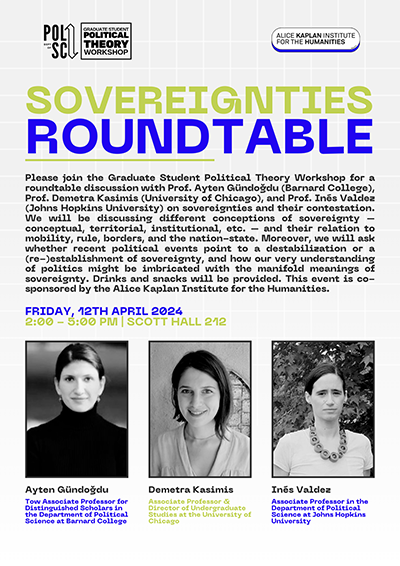 Critical Reflections on Sovereignties
Critical Reflections on Sovereignties
Fri., April 12, 2024
2:00 - 5:00 pm
Scott Hall, Room 212 (601 University Place)
Presented by the Graduate Student Political Theory Workshop of the Department of Political Science, with co-sponsorship from Kaplan Humanities Institute.
Roundtable discussion with Ayten Gündoğdu (Barnard College), Demetra Kasimis (University of Chicago), and Inés Valdez (Johns Hopkins University) on sovereignties and their contestation. We will discuss different conceptions of sovereignty — conceptual, territorial, institutional, etc. — and their relation to mobility, rule, borders, and the nation-state. Moreover, we will ask whether recent political events point to a destabilization or a (re-)establishment of sovereignty, and how our very understanding of politics might be imbricated with the manifold meanings of sovereignty. Drinks and snacks will be provided.
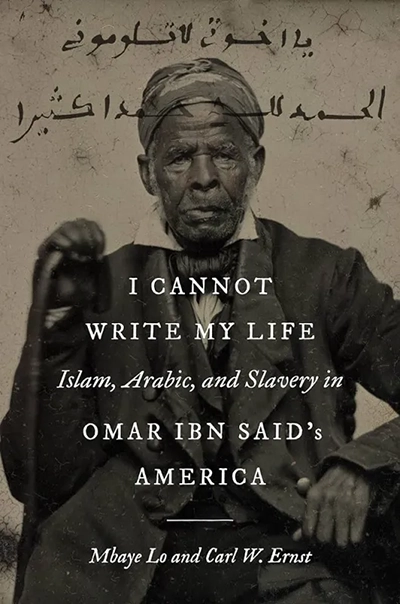 I Cannot Write My Life: Islam, Arabic, and Slavery in Omar ibn Said's America
I Cannot Write My Life: Islam, Arabic, and Slavery in Omar ibn Said's America
A Book Talk with Mbaye Lo and Carl Ernst
Wed., April 24, 2024
12:00 - 1:00 pm (lunch will be served)
620 Library Place
Zoom option added: https://tinyurl.com/yz63k5sh
Presented by Northwestern's Institute for the Study of Islamic Thought in Africa and the Program of African Studies, with co-sponsorship from Kaplan Humanities Institute.
Mbaye Lo and Carl Ernst will discuss their new book, I Cannot Write My Life: Islam, Arabic, and Slavery in Omar ibn Said's America (University of North Carolina Press, 2023).
Omar ibn Said (1770–1863) was a Muslim scholar from West Africa who spent more than fifty years enslaved in the North Carolina household of James Owen, brother of Governor John Owen. In 1831 Omar composed a brief autobiography, the only known narrative written in Arabic by an enslaved person in North America, and he became famous for his Arabic writings. His enslavers also provided him with an Arabic Bible and claimed Omar as a convert to Christianity, prompting wonder and speculation among amateur scholars of Islam, white slave owners, and missionaries. But these self-proclaimed experts were unable or unwilling to understand Omar's writings, and his voice was suppressed for two centuries.
In this book, Mbaye Lo and Carl W. Ernst weave fresh and accurate translations of Omar's eighteen surviving writings, for the first time identifying his quotations from Islamic theological texts, correcting many distortions, and providing the fullest possible account of his life and significance. Placing Omar at the center of a broader network of the era's literary and religious thought, Lo and Ernst restore Omar's voice, his sophisticated engagement with Islamic and Christian theologies, his Arabic skills, and his extraordinary efforts to express himself and exert agency despite his enslavement.
Mbaye Lo is associate professor of the practice of Asian and Middle Eastern studies and international comparative studies at Duke University. Carl W. Ernst is William R. Kenan Jr. Distinguished Professor Emeritus at the University of North Carolina at Chapel Hill.
winter 2024
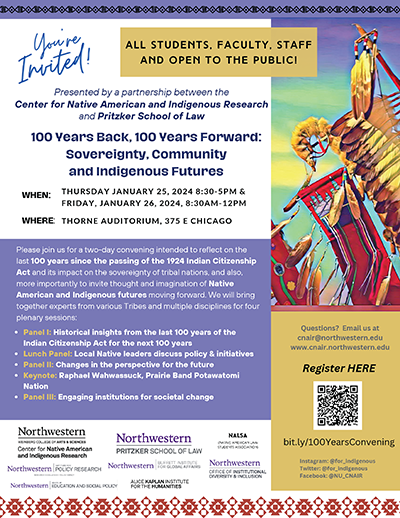 100 Years Back, 100 Years Forward:
100 Years Back, 100 Years Forward:
Sovereignty, Community, and Indigenous Futures
Thurs., January 25, 2024—8:30 am - 5:00 pm
Fri., January 26, 2024—8:30 am to 12:00 pm
Thorne Auditorium (Chicago campus, 375 E. Chicago Ave.)
Presented by Center for Native American and Indigenous Research (CNAIR) and Pritzker School of Law, with co-sponsorship from Native American Law Students Association, Institute for Policy Research, Buffett Institute for Global Affairs, Northwestern Office of Institutional Diversity and Inclusion, School of Education and Social Policy, and Kaplan Humanities Institute.
Two-day convening intended to reflect on the last 100 years since the passing of the 1924 Indian Citizenship Act and its impact on the sovereignty of tribal nations. But more importantly it is to invite thought and imagination of Indigenous futures moving forward. This event is part of CNAIR’s ten-year plan to create collective engagement with the many layers and dynamics that are implicated both by the historical conditions that have created the present and what is critical in exercising self-determination over the next 100 years.
Full conference agenda and speakers are here: https://cnair.northwestern.edu/opportunitiesandprogramming/100-year-anniversary-theme/pritzker-school-of-law-conference-100-years-back-100-years-forward-sovereignty-community-and-indigenous-futures.html
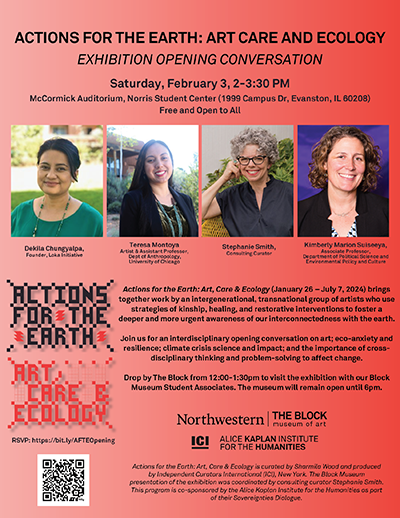 Actions for the Earth: Exhibition Opening Conversation
Actions for the Earth: Exhibition Opening Conversation
Sat., February 3, 2024
2:00 - 3:30 pm
Norris University Center, McCormick Auditorium, First Floor (1999 Campus Drive)
Free and open to all on a first-come first-served basis. RSVPs not required, but appreciated. Click here to RSVP.
Presented by the Block Museum of Art with co-sponsorship from Kaplan Humanities Institute.
Actions for the Earth: Art, Care & Ecology brings together work by an intergenerational, transnational group of artists who use strategies of kinship, healing, and restorative interventions to foster a deeper and more urgent awareness of our interconnectedness with the earth.
Join us for an interdisciplinary opening conversation on art; eco-anxiety and resilience; climate crisis science and impact; and the importance of cross-disciplinary thinking and problem-solving to affect change. Actions for the Earth consulting curator Stephanie Smith will be in dialogue with Dekila Chungyalpa, Director of the Loka Initiative, Center for Healthy Minds at the University of Wisconsin, Madison; Teresa Montoya, Artist and Assistant Professor in the Department of Anthropology at the University of Chicago; and Kimberly Marion Suiseeya, Associate Professor in the Department of Political Science and the Environmental Policy and Culture program at Northwestern University; Faculty Affiliate with the Center for Native American and Indigenous Research and the Center for the Study of Diversity and Democracy.
(Drop by The Block from 12:00-1:30pm to visit the exhibition with The Block Museum Student Associates. The museum will remain open until 6pm.)
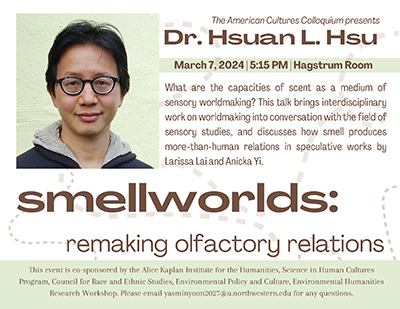 Smellworlds: Remaking Olfactory Relations - Dr. Hsuan L. Hsu
Smellworlds: Remaking Olfactory Relations - Dr. Hsuan L. Hsu
Thurs., March 7, 2024
5:15 pm
Hagstrum Room (University Hall 201)
Presented by the American Cultures Colloquium, with co-sponsorship from Science in Human Culture Program, Council for Race and Ethnic Studies, Environmental Policy and Culture Program, Environmental Humanities Research Workshop, and the Kaplan Humanities Institute.
What are the capacities of scent as a medium of sensory worldmaking? This talk brings interdisciplinary work on worldmaking into conversation with the field of sensory studies, and discusses how smell produces more-than-human relations in speculative works by Larissa Lai and Anicka Yi.
fall 2023
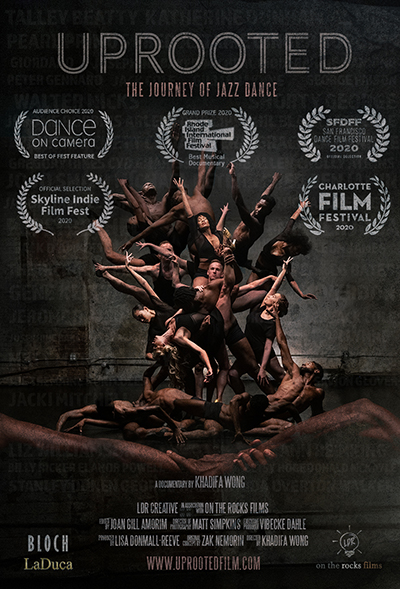 UPROOTED: The Journey of Jazz Dance
UPROOTED: The Journey of Jazz Dance
Film Screening and Talkback
Thurs., October 12, 2023
6:45 PM - 9:00 PM CT
Abbott Hall #203 (710 N. Lake Shore Drive, Chicago)
Presented by SLIPPAGE: Performance | Culture | Technology, with co-sponsorship from Kaplan Humanities Institute
Free tickets; RSVP here: https://www.eventbrite.com/e/free-film-screening-uprooted-the-journey-of-jazz-dance-tickets-722207099877
The film screening will be followed by a talkback with film contributor and SLIPPAGE Artistic Director Thomas F. DeFrantz.
Uprooted, free of any artificial narrative, is a cinematic exploration of this art form, paying homage to its lineage, celebrating its many re-interpretations and through a fast- moving kaleidoscope of movement and music will, inspire the dancer of tomorrow to keep this art form alive. Occupying a contested artscape, Jazz Dance, with its historic and artistic roots in enslaved peoples is also a metaphor for struggle, resistance and acceptance. Learn more on the official site.
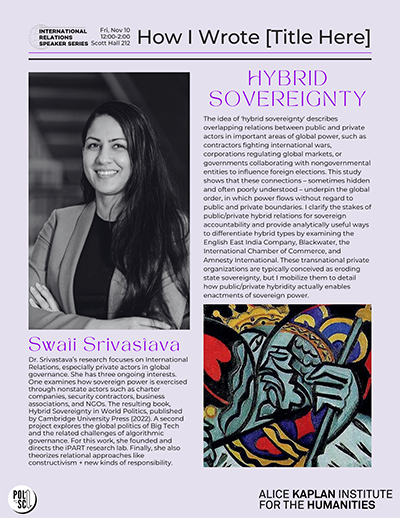 "How I Wrote" Hybrid Sovereignty
"How I Wrote" Hybrid Sovereignty
Swati Srivastava
Fri., November 10, 2023
12:15 PM - 2:00 PM CT
Scott Hall #212 (601 University Place, Evanston)
Presented by the Department of Political Science, with co-sponsorship from Kaplan Humanities Institute, as part of the "How I Wrote" [Title Here]" series and the International Relations Speaker Series.
"The idea of 'hybrid sovereignty' describes overlapping relations between public and private actors in important areas of global power, such as contractors fighting international wars, corporations regulating global markets, or governments collaborating with nongovernmental entities to influence foreign elections. This study shows that these connections—sometimes hidden and often poorly understood—underpin the global order, in which power flows without regard to public and private boundaries. I clarify the stakes of public/private hybrid relations for sovereign accountability and provide analytically useful ways to differentiate hybrid types by examining the English East India Company, Blackwater, the International Chamber of Commerce, and Amnesty International. These transnational private organizations are typically conceived as eroding state sovereignty, but I mobilize them to detail how public/private hybridity actually enables enactments of sovereign power."
Swati Srivastava is Associate Professor, Political Science, Purdue University. Her Dr. Srivastava's research focuses on International Relations, especially private actors in global governance. She has three ongoing interests: One examines how sovereign power is exercised through nonstate actors such as charter companies, security contractors, business associations, and NGOs. The resulting book, Hybrid Sovereignty in World Politics, was published by Cambridge University Press (2022). A second project explores the global politics of Big Tech and the related challenges of algorithmic governance. For this work, she founded and directs the International Politics and Responsible Tech (iPART) research lab. Professor Srivastava also theorizes relational approaches like constructivism and new kinds of responsibility.
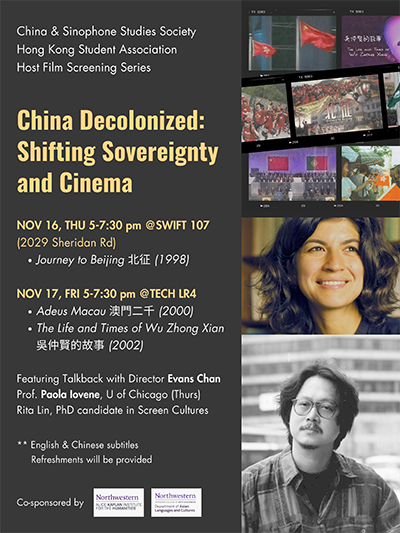 China Decolonized: Shifting Sovereignty and Cultural-Cinematic Implications
China Decolonized: Shifting Sovereignty and Cultural-Cinematic Implications
A series of films by renowned director and critic Evans Chan that explore the shifting sovereignties of Hong Kong and Macau.
Presented by China and Sinophone Studies Society and Hong Kong Student Association with co-sponsorship from Kaplan Humanities Institute.
Thurs., November 16, 2023
5:00 - 7:30 PM
Swift Hall Auditorium #107 (2029 Sheridan Rd.)
* Screening of Journey to Beijing 北征 (1998)
* Talkback with director Evans Chan and Professor Paola Iovene (University of Chicago)
Fri., November 17, 2023
5:00 - 7:30 PM
Technological Institute LR4 (2145 Sheridan Road)
* Screening of Adeus Macau 澳門二千 (2000) and The Life and Times of Wu Zhong Xian 吳仲賢的故事 (2002)
* Talkback with director Evans Chan and Rita Rongyi Lin (PhD candidate in Screen Cultures)
Post-screening talkback topics
The transfer of sovereignty of Hong Kong in 1997 and Macau in 1999 marked significant geopolitical moments in the late 20th century. These transitions initiated profound cultural and aesthetic reconfigurations within the fabric of both regions and of China. We ask, what does this decoloniality imply for the inhabitants of these lands and their cinematic art? How does the sovereignty transfer usher in an era of introspection and redefinition? How are the emergent questions for identity, diaspora, and, in particular, “autonomy” reflected and negotiated in the cinematic and public consciousness? Moreover, how does such art respond to and become reinterpreted in the political landscape post-2014?
Evans Chan: Born in China, raised in Macau and Hong Kong, Chan is a filmmaker, critic, and playwright currently based in New York. Acclaimed by film scholar Michael Berry as “one of the most singularly innovative and diverse figures in the Chinese cultural world in the last 15 years,” he has made more than a dozen fiction and documentary films. His works have been seen at the Berlin, Rotterdam, and Vancouver festivals, among others. He has also published three books of essays in Chinese and is the editor/translator into Chinese of three books by Susan Sontag.
Paola Iovene: Associate Professor in Chinese Literature, University of Chicago. Professor Paola Iovene focuses on twentieth and twenty-first-century Chinese literature and film. Her areas of research include conceptions of Chinese realism, modernism, avant-garde; narrative; and post-1989 Chinese independent documentary film.
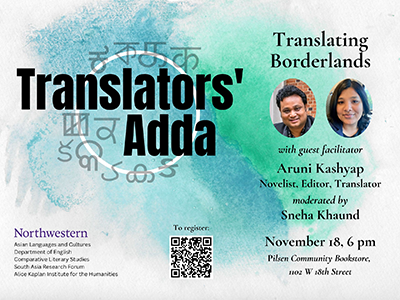 Translators' Adda
Translators' Adda
Translating Borderlands with Aruni Kashyap and Sneha Khaund
Sat., November 18, 2023
6:00 - 7:00 PM CT
Pilsen Community Books (1102 W. 18th St, Chicago)
Click here to register through Eventbrite to receive a copy of the texts before the workshop.
Limited seats available. No prior knowledge of any South Asian language is required for participation. Guests are encouraged to come with questions and observations for the translators. Light refreshments and chai will be served!
Presented by Asian Languages and Cultures, English, Comparative Literary Studies, and South Asia Research Forum with co-sponsorship from Kaplan Humanities Institute.
Can we belong to a nation without feeling at home? How do we engage with borderlands as sites of survival and resistance, beyond the newsflashes of political violence and conflict? What are the tensions between being indigenous, being a citizen, and being South Asian? This event will focus on translations of two Assamese short stories: “Surrender” by Anuradha Sharma Pujari and “The Smell of Bamboo Blossoms” by Yeshe Dorje Thongchi. The session will be facilitated by award-winning translator, writer, and poet Aruni Kashyap and Sneha Khaund, a scholar and translator of contemporary Assamese literature.
Translators’ Adda is a workshop series for discussion of translated texts from South Asia. An Adda in several South Asian vernaculars refers to a gathering of friends talking, laughing, and debating ideas over several cups of chai. The series provides a forum to discuss the day-to-day politics of language, culture, migration, and translation.
